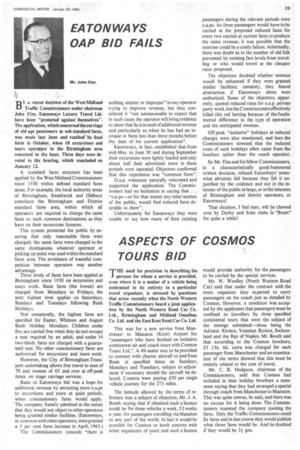EATON WAYS OAP BID FAILS
Page 31

If you've noticed an error in this article please click here to report it so we can fix it.
Mr. John Else.
BYa recent decision of the West Midland 'praline Commissioners under chairman John Else, Eatonways Luxury Travel Ltd. have been "protected against themselves". The application, which concerned the carriage of old-age pensioners at sub-standard fares, was made last June and reached its final form in October, when 10 excursions and tours operators in the Birmingham area remained in the hunt. Three days were devoted to the hearing, Which concluded on January 12.
A standard fares structure has been applied by the West Midland Commissioners since 1930 within defined standard fares areas. For example, the local authority areas of Birmingham, Smethwick and Oldbury constitute the Birmingham and District standard fares area, within which all operators are required to charge the same fares to such common destinations as they have on their excursions licences: This system protected the public by ensuring that only reasonable fares were charged; the same fares were charged to the same destinations whatever operator or picking-up point was used within the standard fares area. The avoidance of wasteful competition between operators was another advantage.
Three levels of fares have been applied at Birmingham since 1930 on excursions and tours work. Basic fares (the lowest) are charged from Mondays to Fridays; the next highest level applies on Saturdays, Sundays and Tuesdays following Bank Holidays.
Not unnaturally, the highest fares are specified for Easter, Whitsun and August Bank Holiday Mondays. Children under five are carried free when they do not occupy a seat required by an adult, and under 14 two-thirds fares are charged with a guaranteed seat. No other concessionary fares are authorized for excursions and tours work.
However, the City of Birmingham Transport undertaking allows free travel to men of 70 and women of 65 and over at off-peak times on stage carriage services.
Basic to Eatonways bid was a hope for additional revenue by attracting more o.a.ps to excursions and tours at quiet periods, when concessionary fares would apply. The company frankly admitted at the outset that they would not object to other operators being granted similar facilities. (Eatonways, in common with other operators, were granted a 5 per cent fares increase in April, 1965.) The Commissioners concede "there is nothing sinister or improper" in any operator trying to improve revenue, but they considered it "not unreasonable to expect that in such cases the operator will bring evidence to show that he is in need of additional revenue and particularly so when he has had an increase in fares less than three months before the date of his current application".
Eatonways, in fact, established that from mid-May to June 30 and during September their excursions were lightly loaded and only about half their advertised tours in these periods were operated. Objectors confirmed that this experience was "common form".
0.a.p. witnesses naturally welcomed and supported the application. The Commissioners had no hesitation in saying that ... "o.a.ps—or for that matter any other section of the public, would find reduced fares desirable to them".
Unfortunately for Eatonways they were unable to say how many of their existing passengers during the relevant periods were o.a.ps. As three passengers would have to be carried at the proposed reduced fares for every two carried at current fares to produce the same revenue, it was possible that the exercise could be a costly failure. Admittedly, there was doubt as to the number of old folk prevented by existing fare levels from travelling or who would travel at the cheaper rates proposed.
The objectors doubted whether revenue would be enhanced if they were granted similar facilities; certainly, they feared abstraction if Eatonways alone were authorized. Some of the objectors, apparently, quoted reduced rates for o.a.p. private party work, but the C ormnissioners effectively killed this red herring because of the fundamental difference in the type of operation and the anticipated revenue.
Off-peak "inclusive" holidays at reduced charges were also mentioned, and here the Commissioners stressed that the reduced, costs of such holidays often came from the hoteliers rather than the coach operator.
So Mr. Else and his fellow Commissioners, in a characteristically good-humoured written decision, refused EatonWays' somewhat altruistic bid because they felt it unjustified by the evidence and not in the interests of the public at large, or in'the interests of Birmingham and district operators, or Eatonways!
That decision, I feel Sure, will be chewed over by Darby and Joan clubs in "Brum" for quite a while!












































































































